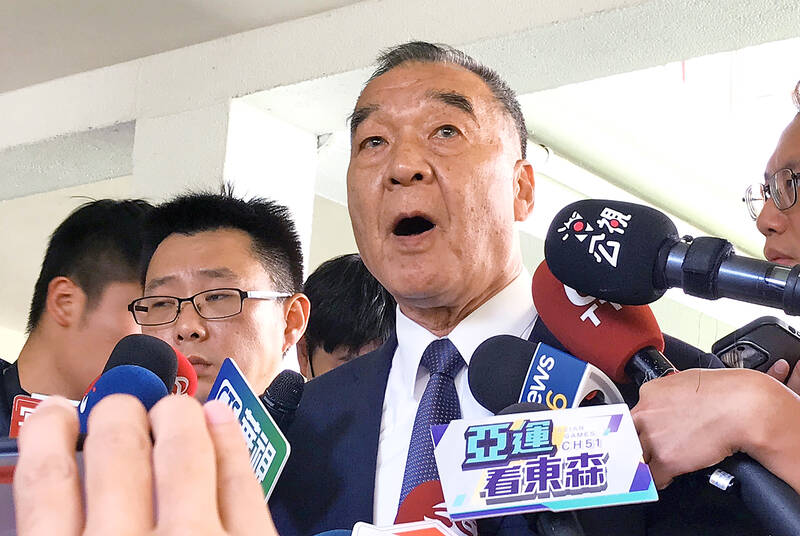Chinese movements around Taiwan were “abnormal,” Minister of National Defense Chiu Kuo-cheng (邱國正) said yesterday, flagging recent amphibious exercises in addition to drills Taipei has observed in China’s Fujian Province.
Taiwan has reported a rise in Chinese military activity over the past week as dozens of fighters, drones, bombers and other aircraft, as well as warships, have operated around the nation.
“Our initial analysis is that they are doing joint drills in September, including land, sea, air and amphibious,” Chiu told reporters at the legislature in Taipei.

Photo: Liu Hsin-de, Taipei Times
The “recent enemy situation is quite abnormal,” he said.
The comments followed a statement from the ministry on Thursday that it was keeping watch on Chinese activities near Dacheng Bay in Fujian Province.
Taiwan security sources said that China performs landing drills in the bay area.
China has not said anything about the drills around Taiwan, and its defense ministry did not respond to two requests for comment.
Chiu said releasing the information about Dacheng Bay was in line with his ministry’s principle of telling people what was happening.
China carried out landing drills in Dacheng Bay in September last year and the year before that, said Chieh Chung (揭仲), a military researcher at the National Policy Foundation think tank.
Those exercises featured civilian ships with equipment practicing “dockless unloading,” to simulate a situation in which they might need to land after port facilities are knocked out of action or destroyed, Chieh said.
However, China would be hard-pressed to carry out a frontal, amphibious invasion of Taiwan, given geographic difficulties, a senior US defense official told the US Congress on Tuesday.
Last week, China also dispatched more than 100 naval ships on regional exercises, in areas such as waters in the South China Sea and off Taiwan’s northeast coast, a regional security official said on condition of anonymity.
China traditionally performs large-scale exercises from July to September, the Ministry of National Defense has said.
Yesterday, the ministry said that it had detected 24 Chinese People’s Liberation Army (PLA) Air Force planes entering Taiwan’s air defense zone over the previous 24 hours, with at least 17 crossing the median line of the Taiwan Strait, as shown on a map it published.
Another security source told reporters, also on condition of anonymity, that China was likely seeking to wear out Taiwan’s military with constant missions so close to Taiwan, especially with longer flights along the median line than before.
“China is seeking to normalize these activities and push Taiwan into a corner,” the source said, adding that it risk a miscalculation if Chinese ships or aircraft got too close and Taiwan opened fire.
Taiwan has frequently said that it would remain calm and not escalate the situation, but that it would not allow “repeated provocations” from China, the source said.

DAREDEVIL: Honnold said it had always been a dream of his to climb Taipei 101, while a Netflix producer said the skyscraper was ‘a real icon of this country’ US climber Alex Honnold yesterday took on Taiwan’s tallest building, becoming the first person to scale Taipei 101 without a rope, harness or safety net. Hundreds of spectators gathered at the base of the 101-story skyscraper to watch Honnold, 40, embark on his daredevil feat, which was also broadcast live on Netflix. Dressed in a red T-shirt and yellow custom-made climbing shoes, Honnold swiftly moved up the southeast face of the glass and steel building. At one point, he stepped onto a platform midway up to wave down at fans and onlookers who were taking photos. People watching from inside

A Vietnamese migrant worker yesterday won NT$12 million (US$379,627) on a Lunar New Year scratch card in Kaohsiung as part of Taiwan Lottery Co’s (台灣彩券) “NT$12 Million Grand Fortune” (1200萬大吉利) game. The man was the first top-prize winner of the new game launched on Jan. 6 to mark the Lunar New Year. Three Vietnamese migrant workers visited a Taiwan Lottery shop on Xinyue Street in Kaohsiung’s Gangshan District (崗山), a store representative said. The player bought multiple tickets and, after winning nothing, held the final lottery ticket in one hand and rubbed the store’s statue of the Maitreya Buddha’s belly with the other,

‘NATO-PLUS’: ‘Our strategic partners in the Indo-Pacific are facing increasing aggression by the Chinese Communist Party,’ US Representative Rob Wittman said The US House of Representatives on Monday released its version of the Consolidated Appropriations Act, which includes US$1.15 billion to support security cooperation with Taiwan. The omnibus act, covering US$1.2 trillion of spending, allocates US$1 billion for the Taiwan Security Cooperation Initiative, as well as US$150 million for the replacement of defense articles and reimbursement of defense services provided to Taiwan. The fund allocations were based on the US National Defense Authorization Act for fiscal 2026 that was passed by the US Congress last month and authorized up to US$1 billion to the US Defense Security Cooperation Agency in support of the

‘COMMITTED TO DETERRENCE’: Washington would stand by its allies, but it can only help as much as countries help themselves, Raymond Greene said The US is committed to deterrence in the first island chain, but it should not bear the burden alone, as “freedom is not free,” American Institute in Taiwan Director Raymond Greene said in a speech at the Institute for National Defense and Security Research’s “Strengthening Resilience: Defense as the Engine of Development” seminar in Taipei yesterday. In the speech, titled “Investing Together and a Secure and Prosperous Future,” Greene highlighted the contributions of US President Donald Trump’s administration to Taiwan’s defense efforts, including the establishment of supply chains for drones and autonomous systems, offers of security assistance and the expansion of